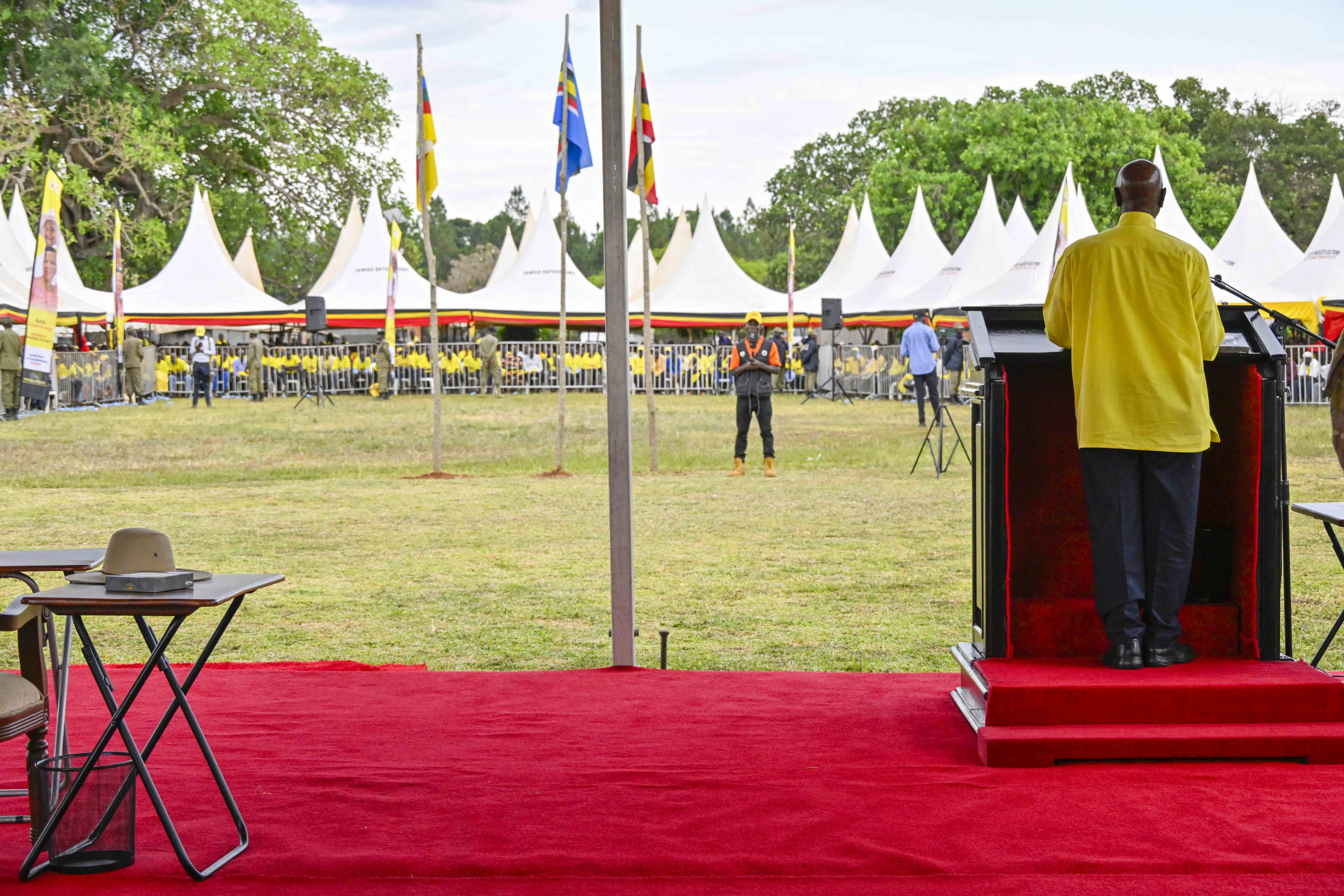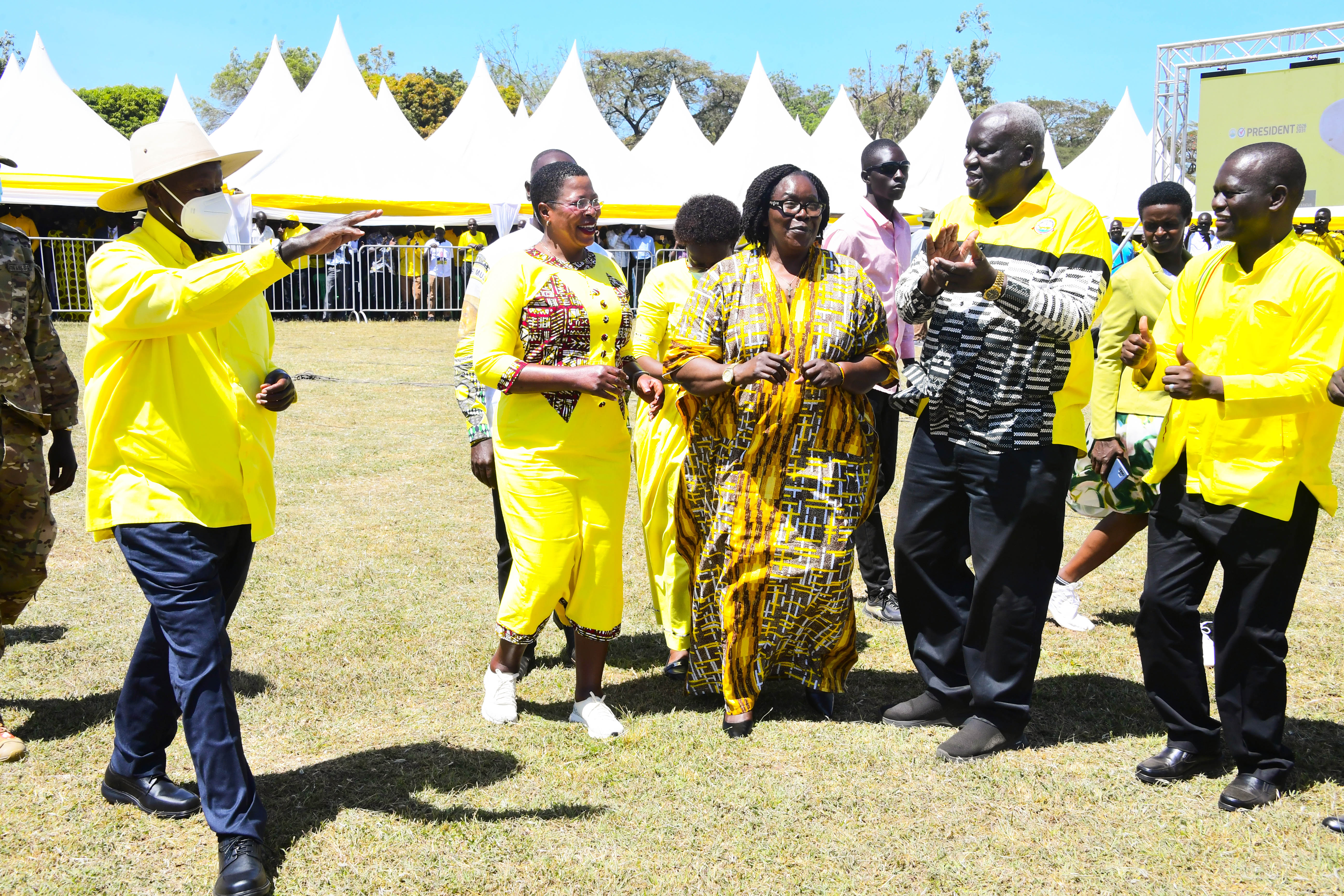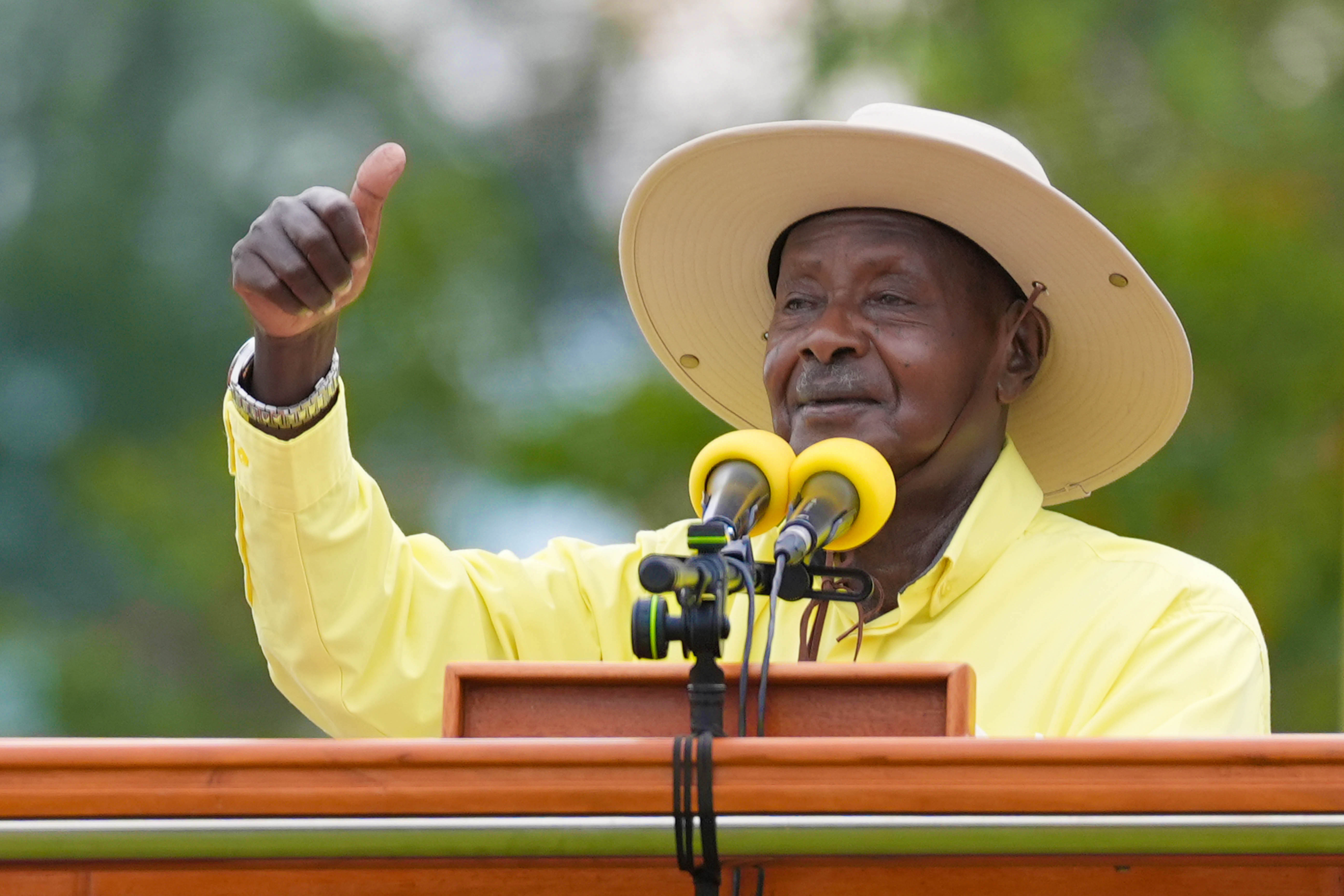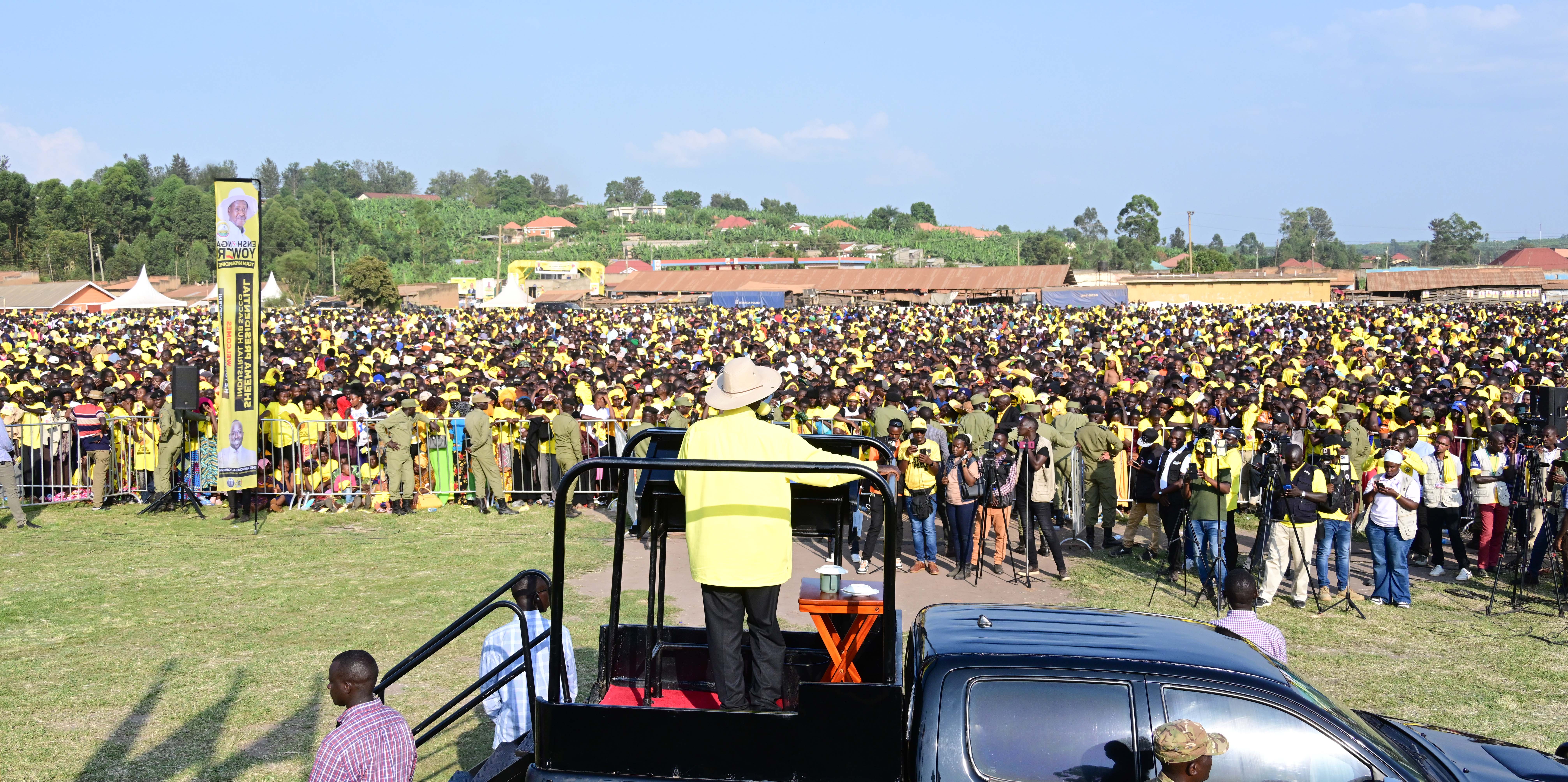“UPDF TO SET UP BARRACKS IN KAMWENGE TO CONSOLIDATE PEACE IN THE AREA,” SAYS PRESIDENT MUSEVENI AS HE ANNOUNCES NEW DEVELOPMENT INTERVENTIONS IN THE DISTRICT
President Yoweri Kaguta Museveni has announced that Kamwenge District will host a Uganda People’s Defence Forces (UPDF) battalion and barracks as the government moves to consolidate peace in an area that for years suffered insecurity linked to Allied Democratic Forces (ADF) rebel activity. President Yoweri Kaguta Museveni, who is also the National Resistance Movement (NRM) Presidential flag bearer, made the announcement today while addressing thousands of supporters during a campaign rally at Kyabenda Primary School playground in Kamwenge District. The President was accompanied by the First Daughter, Mrs. Natasha Karugire Museveni. “For a long time, Kamwenge faced insecurity because of ADF incursions through the forests. But because of unity and a strong army, we have managed to maintain peace,” President Museveni said. “Whenever the ADF attempted to enter this area, we chased them away and defeated them. To consolidate this peace, we are going to establish a battalion here in Kamwenge and look for land to build a barrack.” President Museveni also thanked residents of Kamwenge for the massive turnout and reaffirmed the government's commitment to protecting lives and property. After restoring peace, President Museveni said the government shifted focus to development but encountered persistent poverty at household level, prompting a renewed push for wealth creation. “I am glad to see that many farmers here listened to our message, you have moved away from small-scale maize growing to coffee, fruits and bananas. This is the Ekibaaro I have been preaching, small land, commercial farming. Those who listened are now in the money economy. You should continue,” he emphasized. As part of industrialisation efforts, the President announced that the government will also seek land to establish an industrial park in the district, alongside a presidential slaughter hub to support livestock farmers. He further pledged the establishment of SACCOs and seed nurseries, noting that seed beds will be provided per constituency and per district. On infrastructure, President Museveni said major roads in the region are being prioritised. “We worked from Lyantonde through Ibanda to Kamwenge and Fort Portal. We are now going to work on the Kyenjojo–Kihura road and also improve the Rwimi road,” he said. President Museveni highlighted irrigation as the country’s next major battle, stressing the need to protect wetlands. “Our new war is irrigation. The government will take it seriously, but we must make sure we do not destroy our wetlands,” he said. He also cited exemplary wealth creators in Kamwenge, singling out Mr. Julius Akorinako, a retired District Inspector of Schools, as a model farmer who transformed his livelihood after following government advice. “I thank Julius for listening to our message,” the President said. Mr. Akorinako, who once earned little from maize farming, adopted commercial coffee farming in 2019, starting with two acres of clonal coffee. He later expanded to six acres and now earns an estimated net income of Shs40 million annually, demonstrating the impact of commercial agriculture. On education, President Museveni acknowledged challenges in the implementation of free education, noting that some school administrators have not fully complied. He said the government addressed the gaps by establishing presidential skilling hubs to equip young people with practical skills. One of the beneficiaries, Ms. Racheal Natukunda from Kyenjojo District, shared how the programme transformed her life. A Senior Four dropout who stayed home for three years due to school fees challenges, she enrolled at a presidential skilling hub after learning it offered free training. “At the skilling hub, I studied mindset change and later learnt hairdressing and cosmetology,” she said. “We also learnt how to make products like soap, hair oil and shampoo.” Using the skills acquired, Ms. Natukunda secured a microfinance loan of Shs500,000 and opened her own salon, where she now employs another worker. She has since diversified into poultry farming. Reflecting on her transformation, President Museveni said, “Natukunda was once hopeless. Today she is skilled, she employs others and she owns poultry. That is exactly what we want for our young people.” The President reiterated that the government will continue focusing on peace, infrastructure, skilling and household wealth creation to ensure inclusive development across the country. President Museveni also handed over the NRM flags to aspiring Members of Parliament, LC V chairperson, councillors, and other party candidates in Kamwenge District, formally endorsing their participation in the upcoming elections. On his part, Hon. Frank Tumwebaze, the NRM Chairperson for Kamwenge District and Minister of Agriculture, Animal Industry and Fisheries, said the district’s progress was anchored on security, unity, and deliberate government interventions. “We thank the NRM government for giving us Kamwenge District and for defeating the ADF threat in this region,” Hon. Tumwebaze said. “When the rebels attempted to destabilise the area in 2003, the President deployed the UPDF, which decisively crushed them. That security is what has allowed our people to work and invest.” He commended President Museveni for consistently advising leaders against fragmenting the district, noting that unity had accelerated development. “Kamwenge is one people, united and peaceful. Division would only slow down progress,” he added. Hon. Tumwebaze highlighted a major transformation in household livelihoods, particularly through agriculture. “Previously, most families depended on maize. Today, following government guidance, more than half of our homesteads have shifted to coffee. Many of our farmers are now medium- and large-scale producers,” he said. He attributed the change to the President’s Four-Acre Model initiative, which has enabled even small-scale farmers to earn sustainably and transition into the money economy. Presenting Kamwenge’s current profile, Hon. Tumwebaze said the district has 18 sub-counties and town councils, 74 parishes, and 442 villages, with a population of 337,167 people according to the 2024 census. He noted the district’s strong political participation, recalling that during the 2021 presidential elections, 91,749 voters, about 78% of registered voters turned out to vote, reflecting trust in the NRM leadership. On wealth creation programmes, Hon. Tumwebaze said Kamwenge has so far received over Shs19bn under the Parish Development Model (PDM), with nearly 98 percent of the funds already disbursed to 18,625 households. “Out of our 76,274 households, about a quarter have already benefited from PDM.” He added that the Emyooga programme had also strengthened household enterprises, with 36 SACCOs and more than 15,500 members, supported by government funding of nearly Shs2 billion. Hon. Tumwebaze praised the First Lady and Minister of Education and Sports, Maama Janet Museveni, for expanding access to education in the district through seed schools. Kamwenge currently has 86 government primary schools and 11 government secondary schools, alongside a growing private sector. He revealed that five new seed secondary schools are under construction, a move that will significantly reduce the number of sub-counties without government secondary schools. “Our challenge now is ensuring every parish has access to a government primary school and that no child walks long distances to study,” he said. While acknowledging improvements in health infrastructure, Hon. Tumwebaze said gaps remain, especially in sub-counties without functional health facilities. He disclosed government plans to upgrade several health centres and construct new ones to improve coverage. Leaders also formally requested the upgrade of Kamwenge Health Centre III to Health Centre IV, the deployment of additional health workers, and the establishment of an industrial park in Kamwenge to support agro-processing, including a coffee processing factory. Water access has improved to about 66 percent of rural villages, with numerous piped water systems completed across the district. The government, he said, plans to extend services to the remaining underserved areas. On energy, Hon. Tumwebaze confirmed that Kamwenge is now connected to the national grid, with plans underway to electrify the remaining sub-counties in the next term. He concluded by reaffirming Kamwenge’s loyalty to President Museveni and the NRM, pledging continued mobilisation to support government programmes aimed at transforming lives and lifting more households into the money economy. The event was attended by NRM Central Executive Committee (CEC) members, Members of Parliament, religious and cultural leaders, as well as thousands of supporters.










